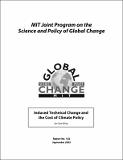| dc.contributor.author | Sue Wing, Ian. | |
| dc.date.accessioned | 2003-10-27T16:07:15Z | |
| dc.date.available | 2003-10-27T16:07:15Z | |
| dc.date.issued | 2003-09 | |
| dc.identifier.other | no. 102 | |
| dc.identifier.uri | http://mit.edu/globalchange/www/abstracts.html#a102 | |
| dc.identifier.uri | http://hdl.handle.net/1721.1/3648 | |
| dc.description | Abstract in HTML and technical report in PDF available on the Massachusetts Institute of Technology Joint Program on the Science and Policy of Global Change website (http://mit.edu/globalchange/www/). | en |
| dc.description.abstract | This paper investigates the potential for a carbon tax to induce R&D, and for the consequent induced technical change (ITC) to lower the macroeconomic cost of abating carbon emissions. ITC is modelled within a general equilibrium simulation of the U.S. economy by the effects of emissions restrictions on the level and composition of aggregate R&D, the accumulation of the stock of knowledge, and the industry-level reallocation and substitution of intangible services derived therefrom. Contrary to other authors, I find that ITC's impact is large, positive and dominated by the latter "substitution effect," which mitigates most of the deadweight loss of the tax. | en |
| dc.description.sponsorship | This research was supported by the Offce of Science (BER), U.S. Department of Energy, Grant No. DE-FG02-02ER63484, and by funding from the MIT Joint Program on the Science and Policy of Global Change, which is supported by a consortium of government, industry and foundation sponsors. | en |
| dc.format.extent | 740056 bytes | |
| dc.format.mimetype | application/pdf | |
| dc.language.iso | en | |
| dc.relation.ispartofseries | ;Report no. 102 | |
| dc.subject | induced technical change | en |
| dc.subject | climate-change policy | en |
| dc.subject | computable general equilibrium models | en |
| dc.title | Induced technical change and the cost of climate policy | en |
